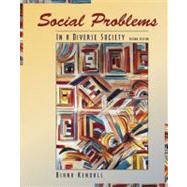
All chapters conclude with “Summary,” “Key Terms,” and “Questions for Critical Thinking.”
Preface.
1. Taking a New Look at Social Problems.
What Is a Social Problem?
The Sociological Imagination and Social Problems.
Sociological Perspectives on Social Problems.
Social Research Methods for Studying Social Problems.
2. Wealth and Poverty: U.S. and Global Economic Inequalities.
Wealth and Poverty in Global Perspective.
Analyzing U.S. Class Inequality.
Poverty in the United States.
Social Welfare in the United States.
3. Racial and Ethnic Inequality.
Racial and Ethnic Inequality as a Social Problem.
Racism, Prejudice, and Discrimination.
Perspectives on Racial and Ethnic Inequality.
Inequalities among Racial and Ethnic Groups.
Can Racial and Ethnic Inequalities Be Reduced?
4. Gender Inequality.
Gender Inequality as a Social Problem.
Gender Inequality and Socialization.
Contemporary Gender Inequality.
Perspectives on Gender Inequality.
Can Gender Inequality Be Reduced?
5. Inequality Based on Age.
Ageism as a Social Problem.
Problems Associated with Aging.
Perspectives on Aging and Social Inequality.
Can Age-Based Inequality Be Reduced?
6. Inequality Based on Sexual Orientation.
Nature and Extent of Inequality Based on Sexual Orientation.
Ideological Bases of Inequality Based on Sexual Orientation.
Discrimination Based on Sexual Orientation.
Perspectives on Sexual Orientation and Social Inequality.
Can Inequalities Based on Sexual Orientation Be Reduced?
7. Prostitution, Pornography, and the Sex Industry.
Deviance, the Sex Industry, and Social Problems.
Prostitution in Global Perspective.
Prostitution in the United States.
Sociological Perspectives on Prostitution.
Pornography.
The Future of Pornography and the Sex Industry.
8. Alcohol and Other Drugs.
Drug Use and Abuse.
Alcohol Use and Abuse.
Tobacco (Nicotine) Use as a Social Problem.
Prescription Drugs, Over-the-Counter Drugs, and Caffeine.
Illegal Drug Use and Abuse.
Explanations of Drug Abuse.
The Future of Alcohol and Drug Abuse.
9. Crime and Criminal Justice.
Crime as a Social Problem.
Types of Crimes.
Who Commits Crimes?
Biological and Psychological Explanation of Crime.
Sociological Explanations of Crime.
The Criminal Justice System.
10. Health Care: Problems of Physical and Mental Illness.
Health Care as a Social Problem.
Mental Illness as a Social Problem.
The Crisis in U.S. Health Care.
Sociological Explanations for Health Care Problems.
11. The Changing Family.
The Nature of Families.
Sociological Perspectives on Family-Related Problems.
Diversity in Intimate Relationships and Families.
Child-Related Family Issues.
Divorce and Remarriage.
Domestic Violence.
Family-Related Problems in the Twenty-First Century.
12. Problems in Education.
Sociological Perspectives on Education.
Problems in U.S. Education.
Problems in School Financing.
Problems in Higher Education.
Educational Problems in the Twenty-First Century.
13. Problems in Politics and the Global Economy.
Types of Economies.
Three Major Modern Economic Systems.
Problems in the Global Economy.
Problems in the U.S. Economy.
Problems in U.S. Politics.
Sociological Perspectives on the Political Economy.
Problems in Politics and the Economy in the Twenty-First Century.
14. Problems in the Media.
The Political Economy of Media Industries.
Global Media Issues.
Potential Media Effects.
Sociological Perspectives on Media-Related Problems.
The Media in the Twenty-First Century.
15. Population and the Environmental Crisis.
Global Overpopulation.
Controlling Fertility.
Immigration and Its Consequences.
Population and the Environment.
Sociological Perspectives on Population and the Environment.
Population and the Environment in the Twenty-First Century.
16. Urban Problems.
Changes in U.S. Cities.
Urban Problems in the United States.
Problems in Global Cities.
Sociological Perspectives on Urban Problems.
Urban Problems in the Twenty-First Century.
17. Global Social Problems: War and Terrorism.
War as a Social Problem.
Military Technology and War.
Global Terrorism.
Domestic Terrorism in the United States.
Explanations of War and Terrorism.
War and Terrorism in the Twenty-First Century.
18. Can Social Problems Be Solved?
A Review of Major Social Theories on Social Problems.
Social Change and Reducing Social Problems.
Microlevel Attempts to Solve Social Problems.
Mid-Range Attempts to Solve Social Problems.
Macrolevel Attempts to Solve Social Problems.
Glossary.
References.
The New copy of this book will include any supplemental materials advertised. Please check the title of the book to determine if it should include any access cards, study guides, lab manuals, CDs, etc.
The Used, Rental and eBook copies of this book are not guaranteed to include any supplemental materials. Typically, only the book itself is included. This is true even if the title states it includes any access cards, study guides, lab manuals, CDs, etc.